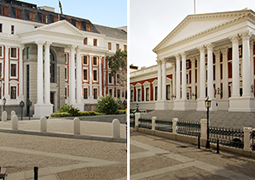
Parliament Wednesday 1 May 2019 - Parliament’s Presiding Officers join millions of workers around the nation in celebrating Worker’s Day.
Originally born from the protracted struggle for workers’ rights and social justice of the late 1800s, Workers’ Day has been an international holiday in many countries since 1891, while in South Africa, it was only officially recognised and observed since the attainment of freedom in 1994.
Parliament views this holiday both as a celebration of workers’ rights and a reminder of the critical role that workers unions played in the fight against Apartheid and in advancing the development of the people of South Africa. Significantly, this year’s Workers Day commemoration comes a few days after the nation’s celebration of 25 years of freedom on April 27. A crucial day on our national calendar, Freedom Day is an annual celebration of South Africa’s first non-racial democratic elections of 1994, with peace, unity, the preservation and restoration of human dignity the bedrock of its foundation.
As such, this year's Workers’ Day celebration is an important milestone in the country’s history, because it marks the recognition of the long and often perilous road, workers travelled in their struggle for the attainment of the freedoms enjoyed by all in South Africa today.
The Presiding Officers said: “We remain mindful of the great strides we have achieved as a nation towards transforming the labour relations landscape through eliminating restrictive and oppressive labour laws and replacing them with a progressive constitution and pieces of legislation that guarantee inalienable rights of workers such as freedom of association, collective bargaining, right to strike and workplace freedom.”
Recently, Parliament passed significant amendments to labour laws aimed at bolstering worker’s rights, improving working conditions and standards of life. These are the Basic Conditions of Employment Amendment Bill, the Labour Relations Amendment Bill, the National Minimum Wage Bill, and the Labour Laws Amendment Bill.
The National Minimum Wage came into effect on 1 May 2018, a befitting tribute to workers of South Africa. The National Minimum Wage was set at R20 per hour and would cover all sectors except farm workers, domestic workers and Expanded Public Works Programme (EPWP) workers. The rate for farm workers was 90% of R20 which was R18 per hour; domestic workers was 75% of R20 which was R15 per hour; EPWP workers would be paid R11 per hour which was 55% of R20. Importantly, the Bill stipulated the National Minimum Wage would be annually reviewed by the National Minimum Wage Commission.
While these are indeed significant strides, as Parliament, we also recognise that much more still needs to be done to fully realise the ideals many workers struggled for and laid down their lives to achieve.
"As such, we recommit ourselves to build a truly people’s Parliament, that spares no effort in ensuring that life-changing laws are made, the executive is overseen fearlessly and the public meaningfully participates in Parliamentary programmes aimed at advancing a non-racial, non-sexist and prosperous nation where all workers enjoy the rights enunciated in the constitution,” said the Presiding Officers.
In a few days, South Africans will head to the polls to elect a new government. The Presiding Officers urge all South Africans to effectively use their right to vote and place a government that will continue to safeguard these basic fundamental rights guaranteed in the constitution and sustain progress towards an ideal society, people of South Africa are yearning for.
ISSUED BY THE PARLIAMENT OF THE REPUBLIC OF SOUTH AFRICA
Enquiries: Moloto Mothapo 082 370 6930

